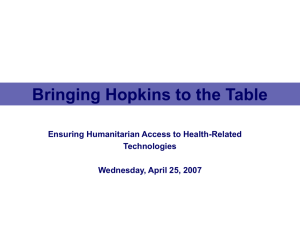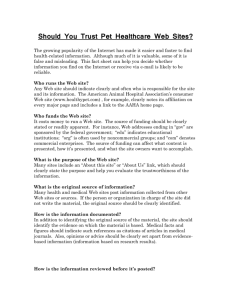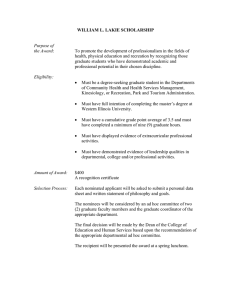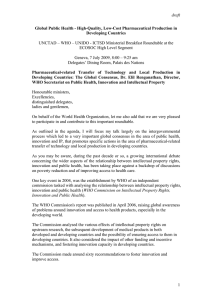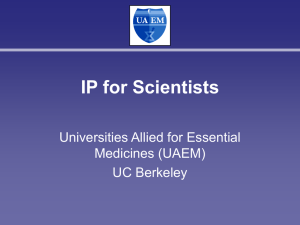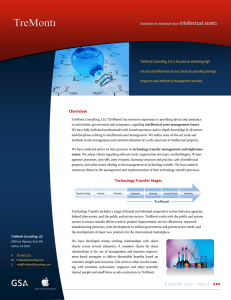OFFICE OF THE VICE-PROVOST (ENTERPRISE) DISSEMINATION OF MEDICAL TECHNOLOGIES
advertisement
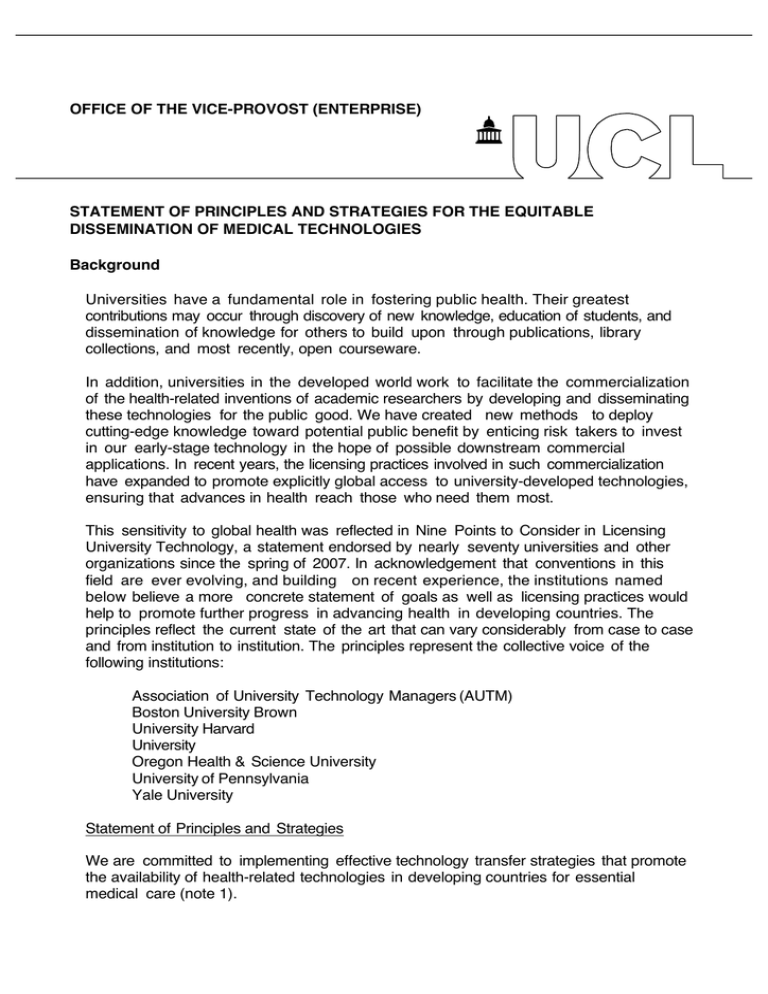
OFFICE OF THE VICE-PROVOST (ENTERPRISE) STATEMENT OF PRINCIPLES AND STRATEGIES FOR THE EQUITABLE DISSEMINATION OF MEDICAL TECHNOLOGIES Background Universities have a fundamental role in fostering public health. Their greatest contributions may occur through discovery of new knowledge, education of students, and dissemination of knowledge for others to build upon through publications, library collections, and most recently, open courseware. In addition, universities in the developed world work to facilitate the commercialization of the health-related inventions of academic researchers by developing and disseminating these technologies for the public good. We have created new methods to deploy cutting-edge knowledge toward potential public benefit by enticing risk takers to invest in our early-stage technology in the hope of possible downstream commercial applications. In recent years, the licensing practices involved in such commercialization have expanded to promote explicitly global access to university-developed technologies, ensuring that advances in health reach those who need them most. This sensitivity to global health was reflected in Nine Points to Consider in Licensing University Technology, a statement endorsed by nearly seventy universities and other organizations since the spring of 2007. In acknowledgement that conventions in this field are ever evolving, and building on recent experience, the institutions named below believe a more concrete statement of goals as well as licensing practices would help to promote further progress in advancing health in developing countries. The principles reflect the current state of the art that can vary considerably from case to case and from institution to institution. The principles represent the collective voice of the following institutions: Association of University Technology Managers (AUTM) Boston University Brown University Harvard University Oregon Health & Science University University of Pennsylvania Yale University Statement of Principles and Strategies We are committed to implementing effective technology transfer strategies that promote the availability of health-related technologies in developing countries for essential medical care (note 1). This Statement primarily addresses one area of engagement through which universities contribute to the broader effort to address the challenges of global health: the management and licensing of medical innovations. Other approaches include the development and dissemination of new knowledge and technologies, the training of physicians and medical researchers, and t he delivery of treatment and care. Because each license is unique, as it reflects the complexities of its subject technology, our approaches will vary from case to case. Our aspirations are constrained by the limits of the role our early stage technologies can play, as well as the modest leverage our technology transfer professionals can exert, in the complex interplay of a delicate ecosystem in which essential medical innovations are made, developed and distributed. We will, nonetheless, be innovative and persistent in order to achieve our goals through patenting and licensing. Toward these goals, the technology transfer offices of the institutions named above commit to follow these guiding principles: 1. In our negotiations with potential licensees we will make vigorous efforts to develop creative and effective licensing strategies that help to promote global access to healthrelated technologies: • We will apprise potential commercial partners of our institutions’ commitment to contribute to the health and well-being of populations throughout the developing world and to cultivate productive relationships with companies that share our values and are able and willing to advance our global health mission; and • We will recognize, and fairly balance, both the early-stage nature of our institutions’ biomedical innovations and the importance of originator pharmaceutical and biopharmaceutical companies in making the substantial investment needed to demonstrate the safety and efficacy of new medicines which, in turn, will allow them to be brought to market in developing countries 2. Our intellectual property should not become a barrier to essential health-related technologies needed by patients in developing countries. In cases where universities can fully preclude intellectual property barriers to generic provision by not patenting in developing countries, or by filing and abandoning patents, we will pursue these strategies. Early publication and wide dissemination of results will be encouraged to reduce opportunities for interfering patents. While there are many additional barriers to access, such as insufficient healthcare infrastructure, preventing intellectual property barriers is critical to achieving access. • We will seek patent protection for such technologies in developing countries only in a manner that is consistent with our objective of facilitating global access. For example, it may be necessary to account for special circumstances (e.g., in India, China or Brazil) that may warrant patenting in such countries on a case-by-case basis, including but not limited to: • The existence in a developing country of pharmaceutical manufacturing capacity suitable to support product distribution both within and outside the developing world; or • The opportunity to gain greater leverage in seeking concessions, such as access to others’ intellectual property, that would help to ensure that the health-related technology can be made available affordably; or • To enable our licensee(s) to implement tiered pricing in those developing countries where a significant private market exists. 3. In those cases where we pursue patent rights, we will negotiate license agreements that draw upon a variety of strategies that seek to align incentives among all stakeholders to promote broad access to health-related technologies in developing countries. Those strategies include, but are not limited to: • Financial incentives to licensees (e.g., elimination or adjustments to royalty rates); • Reserved or ‘march-in’ rights, mandatory sublicenses or non-assert provisions; • Affirmative obligations of diligence, with license reduction, conversion (i.e., to non- exclusivity) or termination as the penalty for default; and • Tiered- or other appropriate pricing on a humanitarian basis (e.g., subsidized, at- cost or no-cost). 4. It is not always possible at the time of license negotiation to anticipate all of the ways a health-related technology may be used in developing countries. Accordingly, we will strive to preserve our institutions’ future rights to negotiate effective global access terms through implementation of such measures as notice requirements coupled with “agreements to agree.” 5. Without regard to the economic value to our respective institutions, we will further support the development of new health-related technologies aimed at diseases that disproportionately burden individuals in the developing world, such as tuberculosis, AIDS, water-borne disease, tropical and other region-specific ailments and parasitic infections endemic to the developing world, through such means as • Continued partnerships with not-for-profit and charitable organizations to provide much-needed collaboration and funding for research in neglected disease areas; • Active efforts to attract and secure appropriate commercial partnerships in further support of such research; and • Engagement with public-private partnerships that can advance the resulting health- related technologies toward regulatory approval. 6. We will work together to develop and apply meaningful metrics to evaluate the success of our efforts to facilitate global access and support continued innovation with particular relevance to global health. 7. We acknowledge that best practices with respect to ensuring that the fruits of university research benefit those in greatest need are emerging and evolving rapidly. To avoid unintended negative consequences with respect to product development in general, and availability in developing countries in particular, flexibility and creativity must be maintained. We understand that this Statement must be a “living document” which, by its nature, needs to evolve and mature in a manner consistent with - and guided by - our accumulated knowledge. Therefore, consistent with all applicable laws and regulations, we will: • Share with one another our collective experiences from working with our licensees in implementing these principles to continually advance our goals. To that end, we will cooperate in the creation of: o A compendium of best practices, tools and techniques; and o A consistent means of reporting on our global access initiatives and activities. • Educate others and encourage their consideration, endorsement and application of the principles articulated in this statement; and • Revisit these principles on an annual basis, to ensure that they reflect currentlyunderstood best practices. This policy only relates to the intellectual property of staff at UCL or postgraduate students with contractual obligations relating to commercialization of intellectual property. They do not apply to undergraduate students or postgraduate students who retain ownership of their own intellectual property. They do not impact or change arrangements relating to copyright. They will be subject to Annual Review and will take effect from 1st October 2013 Professor Stephen Caddick Vice Provost Enterprise UCL Notes 1. The decision about precisely which health-related technologies merit global access licensing is complicated and will be the subject of on-going evaluation by our organizations. While the principles articulated in this statement currently are directed primarily at therapeutics and vaccines, their application to medical diagnostics and devices will be assessed case-by-case on an on-going basis.
